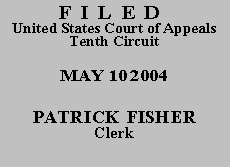

| JAMES FERNANDO TOWNES,
a/k/a James Vernando Townes,
Plaintiff-Appellant, v. CITY OF TULSA, OKLAHOMA; RICO YARBROUGH; EDDIE PARRISH, Defendants-Appellees. |
|
Plaintiff James Fernando Townes, a/k/a James Vernando Townes, proceeding pro se, appeals from an order of the district court granting defendants' motions to dismiss in this action brought pursuant to 42 U.S.C. § 1983. We affirm.
The district court, after affording Mr. Townes an opportunity to amend his complaint, which he declined to do, dismissed his complaint holding that he had failed to state a claim against the City of Tulsa and that the defendant City of Tulsa police officers were entitled to qualified immunity. On appeal, Mr. Townes maintains that he did state a claim against the City of Tulsa. He also argues that the defendant officers are not entitled to qualified immunity because they subjected him to malicious prosecution and false imprisonment by falsely accusing him of possession of cocaine.
The parties are familiar with the facts and we need not repeat them here. "We review the district court's ruling as to defendant[s]' motion to dismiss de novo." Steele v. United States, 19 F.3d 531, 532 (10th Cir. 1994).
Upon review of the record and the parties' briefs on appeal, we hold that Mr. Townes indeed did fail to state a claim against the City of Tulsa. Further, the defendant officers are entitled to qualified immunity as they reasonably believed that probable cause existed to arrest Mr. Townes, a holding born out by the fact that the trial court bound him over for trial. See, e.g., Taylor v. Meacham, 82 F.3d 1556, 1564 (10th Cir. 1996). This determination, of necessity, defeats Mr. Townes' claims of malicious prosecution and false imprisonment. See id. (malicious prosecution); Atkins v. Lanning, 556 F.2d 485, 487 (10th Cir. 1977) (false imprisonment); J. C. Penney Co. v. O'Daniell, 263 F.2d 849, 851 (10th Cir. 1959) (in Oklahoma, probable cause is a defense in false imprisonment cases).
We AFFIRM the judgment of the district court for substantially the reasons stated in its order of August 6, 2003.
Entered for the Court
Circuit Judge
*. This order and judgment is not binding precedent, except under the doctrines of law of the case, res judicata, and collateral estoppel. The court generally disfavors the citation of orders and judgments; nevertheless, an order and judgment may be cited under the terms and conditions of 10th Cir. R. 36.3.